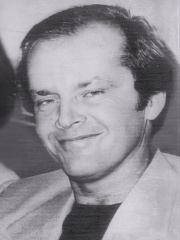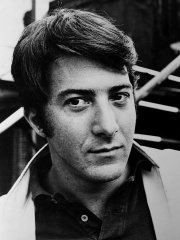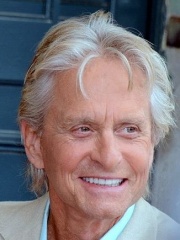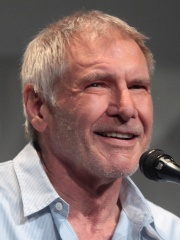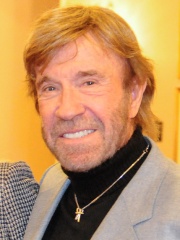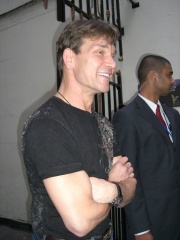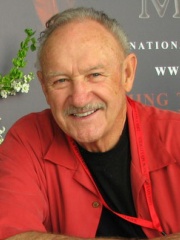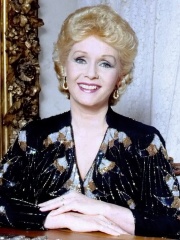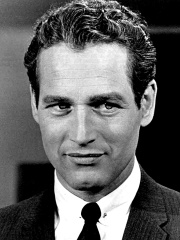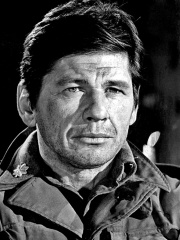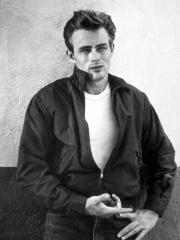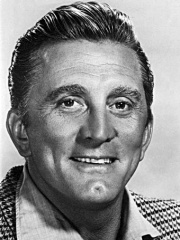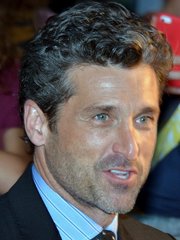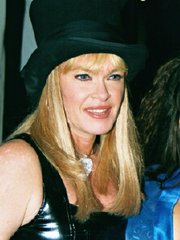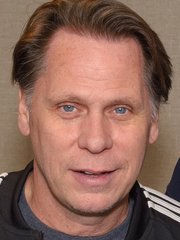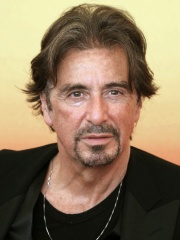
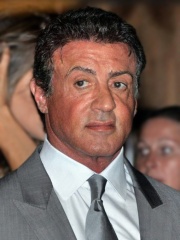
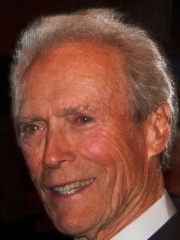
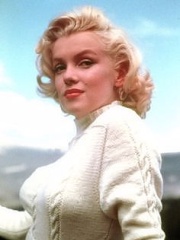
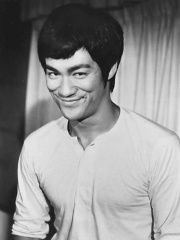
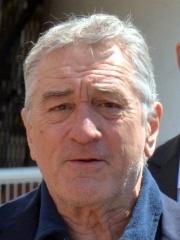

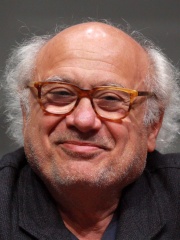
The Most Famous
ACTORS from United States
This page contains a list of the greatest American Actors. The pantheon dataset contains 13,578 Actors, 6,941 of which were born in United States. This makes United States the birth place of the most number of Actors.
Top 10
The following people are considered by Pantheon to be the top 10 most legendary American Actors of all time. This list of famous American Actors is sorted by HPI (Historical Popularity Index), a metric that aggregates information on a biography's online popularity. Visit the rankings page to view the entire list of American Actors.

1. Al Pacino (b. 1940)
With an HPI of 89.27, Al Pacino is the most famous American Actor. His biography has been translated into 122 different languages on wikipedia.
Alfredo James Pacino ( pə-CHEE-noh; Italian: [paˈtʃiːno]; born April 25, 1940) is an American actor. Known for his intense performances on stage and screen, Pacino is widely regarded as one of the greatest actors of all time. His career spans more than five decades, during which he has earned many accolades, including an Academy Award, two Tony Awards, and two Primetime Emmy Awards, achieving the Triple Crown of Acting. He has also received four Golden Globe Awards, a BAFTA, two Screen Actors Guild Awards, and was honored with the Cecil B. DeMille Award in 2001, the AFI Life Achievement Award in 2007, the National Medal of Arts in 2011, and the Kennedy Center Honors in 2016. Films in which he has appeared have grossed over $3 billion worldwide. A method actor, Pacino studied at HB Studio and the Actors Studio where he was taught by Charlie Laughton and Lee Strasberg. Pacino went on to receive the Academy Award for Best Actor for his role in Scent of a Woman (1992). His other Oscar-nominated roles were in The Godfather (1972), Serpico (1973), The Godfather Part II (1974), Dog Day Afternoon (1975), ...And Justice for All (1979), Dick Tracy (1990), Glengarry Glen Ross (1992), and The Irishman (2019). Pacino has starred in many other notable films, including The Panic in Needle Park (1971), Scarecrow (1973), Scarface (1983), Sea of Love (1989), The Godfather Part III (1990), Frankie and Johnny (1991), Carlito's Way (1993), Heat (1995), Donnie Brasco, The Devil's Advocate (both 1997), The Insider, Any Given Sunday (both 1999), Insomnia (2002), The Recruit (2003), Ocean's Thirteen (2007), Once Upon a Time in Hollywood (2019), and House of Gucci (2021). On television, Pacino has acted in multiple productions for HBO, including Angels in America (2003) and the Jack Kevorkian biopic You Don't Know Jack (2010), winning a Primetime Emmy Award for Outstanding Lead Actor in a Miniseries or a Movie for each. Pacino starred in the Amazon Prime Video series Hunters (2020–23). He has also had an extensive career on stage. He is a two-time Tony Award winner, winning Best Featured Actor in a Play in Does a Tiger Wear a Necktie? (1969) and Best Actor in a Play for The Basic Training of Pavlo Hummel (1977). He has also acted as Shylock in a 2004 feature film adaptation and 2010 stage production of The Merchant of Venice. Pacino made his directorial debut with the documentary Looking for Richard (1996). He directed and starred in Chinese Coffee (2000), Wilde Salomé (2011), and Salomé (2013). In 2006, he allowed for his likeness to be used in the video game Scarface: The World Is Yours. Since 1994, he has been the joint president of the Actors Studio.

2. Sylvester Stallone (b. 1946)
With an HPI of 89.20, Sylvester Stallone is the 2nd most famous American Actor. His biography has been translated into 107 different languages.
Sylvester Gardenzio "Sly" Stallone ( stə-LOHN; born July 6, 1946) is an American actor, painter and filmmaker. In a film career spanning more than fifty years, Stallone has received numerous accolades, including a Golden Globe Award and a Critics' Choice Award, as well as nominations for three Academy Awards and two BAFTA Awards. Stallone is one of only two actors in history (alongside Harrison Ford) to have starred in a box-office No. 1 film across six consecutive decades. Films in which he has appeared have grossed over $7.5 billion worldwide. Struggling as an actor for a number of years upon moving to New York City in 1969, Stallone found gradual work in films such as The Lords of Flatbush (1974). He achieved his greatest critical and commercial success starting in 1976 with his iconic role as boxer Rocky Balboa in the first film of the successful Rocky franchise, which he also wrote. In 1977, he became the third actor in history to be nominated for two Academy Awards for Best Original Screenplay and Best Actor. He portrayed the PTSD-plagued soldier John Rambo in First Blood (1982), a role he would play across five Rambo films (1982–2019). He received a star on the Hollywood Walk of Fame in 1984. From the mid-1980s to the late 1990s, Stallone would go on to become one of Hollywood's highest-paid actors acting in action films such as Cobra (1986), Tango and Cash (1989), Cliffhanger (1993), Demolition Man (1993), and The Specialist (1994). At the height of his career, Stallone was known for his rivalry with Arnold Schwarzenegger. Stallone continued his established roles in Rocky Balboa (2006) and Rambo (2008) before launching The Expendables film franchise (2010–present), in which he starred as the mercenary Barney Ross. In 2013, he starred in the successful film Escape Plan and appeared in its sequels. In 2015, he returned to Rocky again with Creed, in which a retired Rocky mentors former rival Apollo Creed's son Adonis Creed. The film brought Stallone widespread praise and his first Golden Globe Award, as well as a third Academy Award nomination, having been first nominated for the same role 40 years prior. He also starred in the sequel Creed II (2018) and portrayed Stakar Ogord in the Marvel Cinematic Universe films Guardians of the Galaxy Vol. 2 (2017) and Guardians of the Galaxy Vol. 3 (2023). Regarded as an icon of action cinema, Stallone is credited with helping redefine the Hollywood action hero. He has occasionally ventured from the action genre, with mixed results. He starred in the comedies Oscar (1991) and Stop! Or My Mom Will Shoot (1992), the first film failed at box office office but the second one had modest success. He also starred in the 1997 drama Cop Land, for which he temporarily shed his sculpted physique and gained weight for his role as a powerless sheriff. In television, he has starred in the Paramount+ crime series Tulsa King (2022–present). In addition to his film work, Stallone is a noted art collector and painter, and has written books on fitness.

3. Clint Eastwood (b. 1930)
With an HPI of 89.20, Clint Eastwood is the 3rd most famous American Actor. His biography has been translated into 108 different languages.
Clinton Eastwood Jr. (born May 31, 1930) is an American actor and film director. After achieving success in the Western TV series Rawhide, Eastwood rose to international fame with his role as the "Man with No Name" in Sergio Leone's Dollars Trilogy of spaghetti Westerns during the mid-1960s and as antihero cop Harry Callahan in the five Dirty Harry films throughout the 1970s and 1980s. These roles, among others, have made Eastwood an enduring cultural icon of masculinity. Elected in 1986, Eastwood served for two years as the mayor of Carmel-by-the-Sea, California. Eastwood's greatest commercial successes are the adventure comedy Every Which Way but Loose (1978) and its action comedy sequel Any Which Way You Can (1980). Other popular Eastwood films include the Westerns Hang 'Em High (1968), The Outlaw Josey Wales (1976) and Pale Rider (1985), the action-war film Where Eagles Dare (1968), the prison film Escape from Alcatraz (1979), the war film Heartbreak Ridge (1986), the action film In the Line of Fire (1993), and the romantic drama The Bridges of Madison County (1995). More recent works include Gran Torino (2008), The Mule (2018), and Cry Macho (2021). Since 1967, Eastwood's company Malpaso Productions has produced all but four of his American films. An Academy Award nominee for Best Actor, Eastwood won Best Director and Best Picture for his Western film Unforgiven (1992) and his sports drama Million Dollar Baby (2004). In addition to directing many of his own star vehicles, Eastwood has directed films in which he did not appear, such as the mystery drama Mystic River (2003) and the war film Letters from Iwo Jima (2006), for which he received Academy Award nominations, as well as the legal thriller Juror #2 (2024). He also directed the biographical films Changeling (2008), Invictus (2009), American Sniper (2014), Sully (2016), and Richard Jewell (2019). Eastwood's accolades include four Academy Awards, four Golden Globe Awards, three César Awards, and an AFI Life Achievement Award. In 2000, he received the Italian Venice Film Festival's Golden Lion award, honoring his lifetime achievements. Bestowed two of France's highest civilian honors, he received the Commander of the Ordre des Arts et des Lettres in 1994, and the Legion of Honour in 2007.

4. Marilyn Monroe (1926 - 1962)
With an HPI of 88.57, Marilyn Monroe is the 4th most famous American Actor. Her biography has been translated into 195 different languages.
Marilyn Monroe ( MARR-ə-lin mən-ROH; born Norma Jeane Mortenson; June 1, 1926 – August 4, 1962) was an American actress and model. Known for playing comic "blonde bombshell" characters, she became one of the most popular sex symbols of the 1950s and early 1960s, as well as an emblem of the era's sexual revolution. She was a top-billed actress for a decade, and her films grossed $200 million (equivalent to $2 billion in 2024) by her death in 1962. Born in Los Angeles, Monroe spent most of her childhood in foster homes and an orphanage before marrying James Dougherty at the age of 16. She was working in a factory during World War II when she met a photographer from the First Motion Picture Unit and began a successful pin-up modeling career, which led to short-lived film contracts with 20th Century Fox and Columbia Pictures. After roles as a freelancer, she began a longer contract with Fox in 1951, becoming a popular actress with roles in several comedies, including As Young as You Feel and Monkey Business, and in the dramas Clash by Night and Don't Bother to Knock. Monroe faced a scandal when it was revealed that she had posed for nude photographs prior to fame, but the story resulted in increased interest in her films. Monroe became one of the most marketable Hollywood stars in 1953. She had leading roles in the film noir Niagara, which overtly relied on her sex appeal, and the comedies Gentlemen Prefer Blondes and How to Marry a Millionaire, which established her star image as a "dumb blonde". The same year, her nude images were used as the centerfold and cover of the first issue of Playboy. Monroe played a significant role in the creation and management of her public image, but felt disappointed when typecast and underpaid by the studio. She was briefly suspended in early 1954 for refusing a film project but returned to star in The Seven Year Itch (1955), one of the biggest box office successes of her career. When the studio was still reluctant to change Monroe's contract, she founded her own film production company in 1954 with her friend Milton Greene. She dedicated 1955 to building the company and began studying method acting under Lee Strasberg at the Actors Studio. Later that year, Fox awarded her a new contract, which gave her more control and a larger salary. Her subsequent roles included a critically acclaimed performance in Bus Stop (1956) and her first independent production in The Prince and the Showgirl (1957), for which she received a BAFTA nomination, and won the David di Donatello Award for Best Actress. She won a Golden Globe for her role in Some Like It Hot (1959), a critical and commercial success. Her last completed film was the drama The Misfits (1961). Monroe's troubled private life received much attention. Her marriages to retired baseball star Joe DiMaggio and to playwright Arthur Miller were highly publicized; both ended in divorce. On August 4, 1962, Monroe died at the age of 36 of a barbiturate overdose at her Los Angeles home. Her death was ruled a probable suicide. Monroe remains a pop culture icon, with the American Film Institute ranking her as the sixth-greatest female screen legend from the Golden Age of Hollywood.
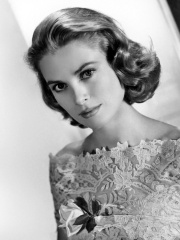
5. Grace Kelly (1929 - 1982)
With an HPI of 86.59, Grace Kelly is the 5th most famous American Actor. Her biography has been translated into 101 different languages.
Grace Patricia Kelly (November 12, 1929 – September 14, 1982) was an American actress and Princess of Monaco as the wife of Prince Rainier III from their marriage on April 18, 1956, until her death in 1982. Prior to her marriage, she achieved stardom in several significant Hollywood films in the early to mid-1950s. She received an Academy Award and three Golden Globe Awards, and was ranked 13th on the American Film Institute's 25 Greatest Female Stars list. Kelly was born into a prominent Catholic family in Philadelphia. After graduating from the American Academy of Dramatic Arts in 1949, she began appearing in New York City theatrical productions and television broadcasts. Kelly made her film debut in Fourteen Hours (1951) and gained stardom from her roles in Fred Zinnemann's western film High Noon (1952), and John Ford's adventure-romance Mogambo (1953), the latter of which earned her the Academy Award for Best Supporting Actress nomination. She won the Academy Award for Best Actress for her performance in the drama The Country Girl (1954). Other notable works include the war film The Bridges at Toko-Ri (1954), the romantic comedy High Society (1956), and three Alfred Hitchcock suspense thrillers: Dial M for Murder (1954), Rear Window (1954), and To Catch a Thief (1955). Kelly retired from acting at age 26 to marry Rainier and began her duties as Princess of Monaco. Grace and Rainier had three children: Princess Caroline, Prince Albert, and Princess Stéphanie. Princess Grace's charity work focused on young children and the arts. In 1964, she established the Princess Grace Foundation to support local artisans. Her organization for children's rights, AMADE Mondiale, gained consultive status within UNICEF and UNESCO. Her final film role was narrating The Children of Theatre Street (1977), which was nominated for an Academy Award for Best Documentary Feature. She died at the age of 52 at Monaco Hospital, from injuries sustained in a car crash. Her son, Prince Albert, helped establish the Princess Grace Awards in 1984 to recognize emerging performers in film, theatre, and dance.

6. Bruce Lee (1940 - 1973)
With an HPI of 86.28, Bruce Lee is the 6th most famous American Actor. His biography has been translated into 128 different languages.
Bruce Lee (born Lee Jun-fan; November 27, 1940 – July 20, 1973) was a Hong Kong and American martial artist, actor, and filmmaker. He was the founder of Jeet Kune Do, a hybrid martial arts philosophy, which was formed from his experiences in unarmed fighting and self-defense—as well as eclectic, Zen Buddhist, and Taoist philosophies—as a new school of martial arts thought. With a career spanning British Hong Kong and the United States, Lee is regarded as the first global Chinese film star and one of the most influential martial artists in the history of cinema. Known for his roles in five feature-length martial arts films, he is credited with helping to popularize martial arts films in the 1970s and promoting Hong Kong action cinema. Born in San Francisco and raised in Hong Kong, Lee was introduced to the Hong Kong film industry as a child actor by his father, Lee Hoi-chuen. Lee's early martial arts experience included Wing Chun (trained under Ip Man), tai chi, boxing (winning a Hong Kong boxing tournament), and frequent street fighting (neighborhood and rooftop fights). He moved to Seattle in 1959, enrolling at the University of Washington in 1961. It was during this time that Lee began to consider making money by teaching martial arts, even though he aspired to have a career in acting. He opened his first martial arts school, operated out of his home in Seattle. After later adding a second school in Oakland, California, Lee once drew significant attention at the 1964 Long Beach International Karate Championships of California by making demonstrations and speaking. He subsequently moved to Los Angeles to teach, where his students included Chuck Norris, Sharon Tate, and Kareem Abdul-Jabbar. Lee's roles in the United States, including Kato in the ABC action television series The Green Hornet (1966–1967), introduced him to American audiences. After returning to Hong Kong in 1971, he landed his first leading role in The Big Boss (1971), directed by Lo Wei. A year later, Lee starred in Fist of Fury (1972), in which he portrayed Chen Zhen, and The Way of the Dragon (1972), which he directed and wrote. Lee went on to star in the American-Hong Kong co-production Enter the Dragon (1973) and The Game of Death (1978). His Hong Kong- and Hollywood-produced films, all of which were commercially successful, elevated Hong Kong martial arts films to a new level of popularity and acclaim, sparking a surge of Western interest in Chinese martial arts. The direction and tone of Lee's films, including their fight choreography and diversification, dramatically influenced and changed martial arts and martial arts films worldwide. With his influence, kung fu films began to displace the wuxia film genre—fights were choreographed more realistically, fantasy elements were discarded for real-world conflicts, and the characterisation of the male lead went from simply being a chivalrous hero to one that embodied the notion of masculinity. Lee's career was cut short by his sudden death at the age of 32 from brain edema, the causes of which remain a matter of dispute. Nevertheless, Lee's films remained popular, gained a large cult following, and became widely imitated and exploited. He became an iconic figure known throughout the world, particularly among the Chinese, based upon his portrayal of Cantonese culture in his films, and among Asian Americans for defying Asian stereotypes in the United States. Even after his death, Lee has continued to be a prominent influence on modern combat sports, including judo, karate, mixed martial arts, and boxing, as well as modern popular culture, including film, television, comics, animation, and video games. Time magazine named him one of the 100 most important people of the 20th century.

7. Robert De Niro (b. 1943)
With an HPI of 83.81, Robert De Niro is the 7th most famous American Actor. His biography has been translated into 123 different languages.
Robert Anthony De Niro ( də NEER-roh, Italian: [de ˈniːro]; born August 17, 1943) is an American actor, director, and film producer. He is considered to be one of the greatest and most influential actors of his generation. De Niro is the recipient of various accolades, including two Academy Awards and a Golden Globe Award as well as nominations for eight BAFTA Awards and four Emmy Awards. He was honored with the AFI Life Achievement Award in 2003, the Kennedy Center Honors in 2009, the Cecil B. DeMille Award in 2011, the Presidential Medal of Freedom in 2016, the Screen Actors Guild Life Achievement Award in 2019, and the Honorary Palme d'Or in 2025. De Niro studied acting at HB Studio, Stella Adler Conservatory, and Lee Strasberg's Actors Studio. He won the Academy Award for Best Supporting Actor for his role as Vito Corleone in the crime drama The Godfather Part II (1974), becoming the first male to win for an Italian-language performance. Six years later, he won the Academy Award for Best Actor for his portrayal of Jake LaMotta in the biopic drama Raging Bull (1980). He was further Oscar-nominated for his performances in Taxi Driver (1976), The Deer Hunter (1978), Awakenings (1990), Cape Fear (1991), Silver Linings Playbook (2012), and Killers of the Flower Moon (2023), while also earning a nomination for Best Picture for producing The Irishman (2019). De Niro is known for his dramatic roles in Mean Streets (1973), 1900 (1976), The King of Comedy (1982), Once Upon a Time in America (1984), Brazil (1985), The Mission (1986), Angel Heart (1987), The Untouchables (1987), Goodfellas (1990), This Boy's Life (1993), Heat (1995), Casino (1995), Jackie Brown (1997), Ronin (1998), and Joker (2019), as well as his comedic roles in Midnight Run (1988), Wag the Dog (1997), Analyze This (1999), the Meet the Parents films (2000–present), and The Intern (2015). He directed and acted in both the crime drama A Bronx Tale (1993) and the spy film The Good Shepherd (2006). On television, he portrayed Bernie Madoff in the HBO film The Wizard of Lies (2017). De Niro and producer Jane Rosenthal founded the film and television production company TriBeCa Productions in 1989, which has produced several films alongside his own. Also with Rosenthal, he founded the Tribeca Film Festival in 2002. Many of De Niro's films are considered classics of American cinema. Six of De Niro's films have been inducted into the United States National Film Registry by the Library of Congress as "culturally, historically, or aesthetically significant" as of 2023. Five films were listed on the AFI's 100 greatest American films of all time.

8. Marlon Brando (1924 - 2004)
With an HPI of 82.91, Marlon Brando is the 8th most famous American Actor. His biography has been translated into 134 different languages.
Marlon Brando Jr. (April 3, 1924 – July 1, 2004) was an American actor. Widely regarded as one of the greatest and most influential actors in the history of cinema, Brando received numerous accolades throughout his career, which spanned six decades, including two Academy Awards, two Golden Globe Awards, a Cannes Film Festival Award, three British Academy Film Awards, and an Emmy Award. Brando is credited with being one of the first actors to bring the Stanislavski system of acting and method acting to mainstream audiences. Brando came under the influence of Stella Adler and Stanislavski's system in the 1940s. He began his career on stage, where he was lauded for adeptly interpreting his characters. He made his Broadway debut in the play I Remember Mama (1944) and won Theater World Awards for his roles in the plays Candida and Truckline Cafe, both in 1946. He returned to Broadway as Stanley Kowalski in the Tennessee Williams play A Streetcar Named Desire (1947), a role he reprised in the 1951 film adaptation, directed by Elia Kazan. He made his film debut playing a wounded G.I. in The Men (1950) and won two Academy Awards for Best Actor for his roles as a dockworker in the crime drama film On the Waterfront (1954) and Vito Corleone in the gangster epic The Godfather (1972). He was Oscar-nominated for playing Stanley Kowalski in A Streetcar Named Desire (1951), Emiliano Zapata in Viva Zapata! (1952), Mark Antony in Julius Caesar (1953), an air force pilot in Sayonara (1957), an American expatriate in Last Tango in Paris (1973), and a lawyer in A Dry White Season (1989). Brando was known for playing characters who later became popular icons, such as the rebellious motorcycle-gang leader Johnny Strabler in The Wild One (1953), and he came to be seen as an emblem of the era's so-called "generation gap", with his portrayal of rebelliousness. He also starred in such films as Guys and Dolls (1955), The Young Lions (1958), The Fugitive Kind (1960), The Chase (1966), Burn! (1969), The Missouri Breaks (1976), Superman (1978), Apocalypse Now (1979), and The Freshman (1990). He made his directorial film debut with, and also starred in, the western drama One-Eyed Jacks (1961), which did poorly at the box office. On television, Brando won the Primetime Emmy Award for Outstanding Supporting Actor in a Limited Series or Movie for his role in the ABC miniseries Roots: The Next Generations (1979), after which he took a nine-year hiatus from acting. He later returned to film, with varying degrees of commercial and critical success. The last two decades of his life were marked by controversy, and his troubled private life received significant public attention. He struggled with mood disorders and legal issues. His last films include The Island of Dr. Moreau (1996) and The Score (2001).

9. Danny DeVito (b. 1944)
With an HPI of 82.24, Danny DeVito is the 9th most famous American Actor. His biography has been translated into 82 different languages.
Daniel Michael DeVito Jr. (born November 17, 1944) is an American actor and filmmaker. Known for his short stature, raspy voice, distinct accent, and energetic comedy roles, he gained prominence for his portrayal of the taxi dispatcher Louie De Palma in the television series Taxi (1978–1983), which won him a Golden Globe Award and an Emmy Award. Since 2006, he has played Frank Reynolds on the FXX sitcom It's Always Sunny in Philadelphia. DeVito is known for his film roles in One Flew Over the Cuckoo's Nest (1975), Terms of Endearment (1983), Romancing the Stone (1984), The Jewel of the Nile (1985), Ruthless People (1986), Throw Momma from the Train (1987), Twins (1988), The War of the Roses (1989), Batman Returns (1992), Jack the Bear (1993), Junior (1994), Matilda (1996), L.A. Confidential (1997), The Big Kahuna (1999), Big Fish (2003), Deck the Halls (2006), When in Rome (2010), Wiener-Dog (2016) and Jumanji: The Next Level (2019). He has voiced roles in such films as Hercules (1997), The Lorax (2012), Smallfoot (2018) and Migration (2023). DeVito and Michael Shamberg founded Jersey Films. Soon afterwards, Stacey Sher became an equal partner. The production company is known for films such as Pulp Fiction (1994), Garden State (2004) and Freedom Writers (2007). DeVito also owned Jersey Television, which produced the Comedy Central series Reno 911!. DeVito and wife Rhea Perlman starred together in his 1996 film Matilda, based on Roald Dahl's children's novel. DeVito was also one of the producers nominated for an Academy Award for Best Picture for Erin Brockovich (2000). From 2012 to 2013, DeVito played Willie Clark in the West End revival of Neil Simon's The Sunshine Boys. He made his Broadway debut as Gregory Solomon in the revival of Arthur Miller's The Price (2017), earning a Tony Award nomination for his performance. He returned to Broadway in the Theresa Rebeck play I Need That (2023).
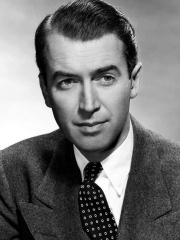
10. James Stewart (1908 - 1997)
With an HPI of 82.24, James Stewart is the 10th most famous American Actor. His biography has been translated into 87 different languages.
James Maitland Stewart (May 20, 1908 – July 2, 1997) was an American actor and military aviator. Known for his distinctive drawl and everyman screen persona, Stewart appeared in 80 films from 1935 to 1991. With the strong morality he portrayed both on and off the screen, he epitomized the "American ideal" in the mid-twentieth century. In 1999, the American Film Institute (AFI) ranked him third on its list of the greatest American male actors; he received numerous honors including the AFI Life Achievement Award in 1980, the Kennedy Center Honor in 1983, as well as the Academy Honorary Award and Presidential Medal of Freedom, both in 1985. Born and raised in Indiana, Pennsylvania, Stewart started acting while at Princeton University. After graduating, he began a career as a stage actor making his Broadway debut in the play Carry Nation (1932). He landed his first supporting role in The Murder Man (1935) and had his breakthrough in Frank Capra's ensemble comedy You Can't Take It with You (1938). Stewart went on to receive the Academy Award for Best Actor for his performance in the George Cukor romantic comedy The Philadelphia Story (1940). His other Oscar-nominated roles were in Mr. Smith Goes to Washington (1939), It's a Wonderful Life (1946), Harvey (1950) and Anatomy of a Murder (1959). Stewart played darker, more morally ambiguous characters in movies directed by Anthony Mann, including Winchester '73 (1950), The Glenn Miller Story (1954), and The Naked Spur (1953), and by Alfred Hitchcock in Rope (1948), Rear Window (1954), The Man Who Knew Too Much (1956), and Vertigo (1958). Stewart also starred in The Shop Around the Corner (1940), The Greatest Show on Earth (1952), The Spirit of St. Louis (1957), and The Flight of the Phoenix (1965) as well as the Western films How the West Was Won (1962), The Man Who Shot Liberty Valance (1962), and Cheyenne Autumn (1964). With his private pilot's skills, he enlisted in the US Army Air Forces during World War II seeking combat duty and rose to be deputy commanding officer of the 2nd Bombardment Wing and commanding the 703d Bombardment Squadron from 1941 to 1947. He later transferred to the Air Force Reserve, and held various command positions until his retirement in 1968 as a brigadier general. Stewart remained unmarried until his 40s and was dubbed "The Great American Bachelor" by the press. In 1949, he married former model Gloria Hatrick McLean; they had twin daughters, and he adopted her two sons from her previous marriage; the marriage lasted until Gloria's death in 1994. Stewart died of a pulmonary embolism three years later.
People
Pantheon has 6,940 people classified as American actors born between 1807 and 2010. Of these 6,940, 4,905 (70.68%) of them are still alive today. The most famous living American actors include Al Pacino, Sylvester Stallone, and Clint Eastwood. The most famous deceased American actors include Marilyn Monroe, Grace Kelly, and Bruce Lee. As of April 2024, 529 new American actors have been added to Pantheon including Patrick Dempsey, Lauren Sánchez Bezos, and Chad McQueen.
Living American Actors
Go to all RankingsAl Pacino
1940 - Present
HPI: 89.27
Sylvester Stallone
1946 - Present
HPI: 89.20
Clint Eastwood
1930 - Present
HPI: 89.20
Robert De Niro
1943 - Present
HPI: 83.81
Danny DeVito
1944 - Present
HPI: 82.24
Morgan Freeman
1937 - Present
HPI: 81.12
Jack Nicholson
1937 - Present
HPI: 80.94
Dustin Hoffman
1937 - Present
HPI: 80.69
Nicolas Cage
1964 - Present
HPI: 80.07
Michael Douglas
1944 - Present
HPI: 79.51
Harrison Ford
1942 - Present
HPI: 79.27
Chuck Norris
1940 - Present
HPI: 79.26
Deceased American Actors
Go to all RankingsMarilyn Monroe
1926 - 1962
HPI: 88.57
Grace Kelly
1929 - 1982
HPI: 86.59
Bruce Lee
1940 - 1973
HPI: 86.28
Marlon Brando
1924 - 2004
HPI: 82.91
James Stewart
1908 - 1997
HPI: 82.24
Patrick Swayze
1952 - 2009
HPI: 81.93
Gene Hackman
1930 - 2025
HPI: 81.14
Debbie Reynolds
1932 - 2016
HPI: 80.02
Paul Newman
1925 - 2008
HPI: 79.93
Charles Bronson
1921 - 2003
HPI: 79.90
James Dean
1931 - 1955
HPI: 78.85
Kirk Douglas
1916 - 2020
HPI: 78.83
Newly Added American Actors (2025)
Go to all RankingsPatrick Dempsey
1966 - Present
HPI: 63.43
Lauren Sánchez Bezos
1969 - Present
HPI: 59.52
Chad McQueen
1960 - 2024
HPI: 53.10
Carré Otis
1968 - Present
HPI: 52.22
Porsche Lynn
1962 - Present
HPI: 50.55
Casey Siemaszko
1961 - Present
HPI: 50.13
Billy Warlock
1961 - Present
HPI: 49.98
Ola Ray
1960 - Present
HPI: 49.82
Michael T. Weiss
1962 - Present
HPI: 49.81
Don Harvey
1960 - Present
HPI: 49.64
Sarah G. Buxton
1965 - Present
HPI: 49.37
Leif Garrett
1961 - Present
HPI: 49.29
Overlapping Lives
Which Actors were alive at the same time? This visualization shows the lifespans of the 25 most globally memorable Actors since 1700.


